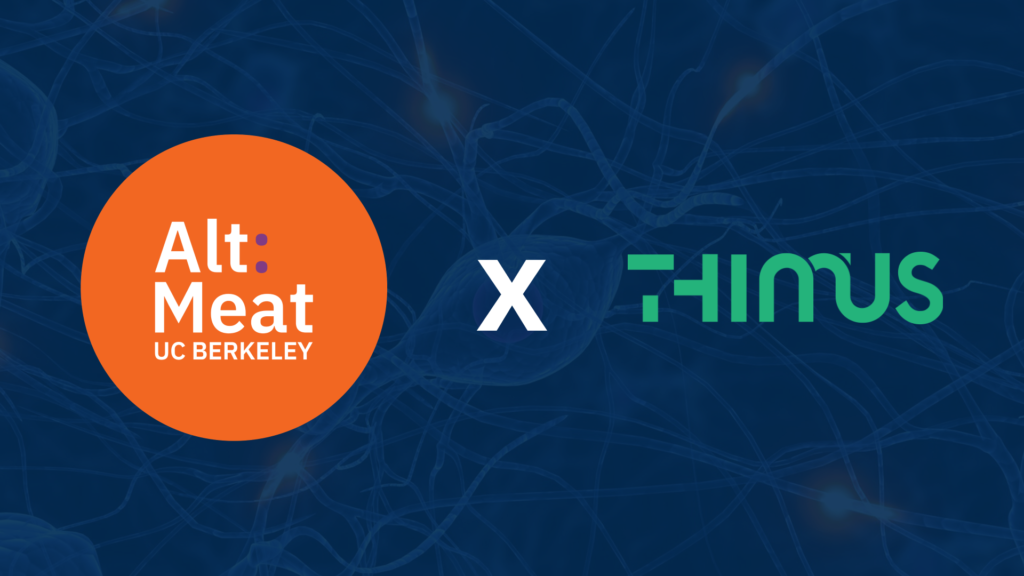Berkeley Alternative Meats X-Lab Partners with Thimus to Explore How Food Neuroscience can Transform Food Systems

The partnership will allow UC Berkeley faculty and students to collaborate with Thimus to investigate how to create healthy, affordable, and culturally aware foods that improve well-being
The Berkeley Alternative Meats X-Lab is partnering with Thimus, a food neuroscience company with bases in Italy and the United States, to investigate how to create next generation food that is healthy, sustainable, improves well-being, and incorporates the diverse and rich ways that cultures around the world experience food. The collaboration will help the X-Lab and Thimus better understand human relationships with food and how these relationships affect the human experience, such as with habits, emotions, behavior, and mood.
“We are very excited about this new partnership with Thimus. In recent years, innovators have made a lot of technical progress with novel food products, giving consumers new choices for how they eat meat, dairy, and other foods. At the same time, entrepreneurs currently know very little about how these new foods might fit into the world’s rich and diverse cultures of food, which are a substantial part of the human experience,” says Ricardo San Martin, Director, Berkeley Alternative Meats X-Lab.
The partnership will investigate the qualitative aspects of how peoples and cultures enjoy food, and how food rituals, practices, and traditions have shaped societies around the world. At the same time, Thimus will work with the X-Lab to better develop quantitative methods for understanding how food affects well-being, including understanding the physiological changes that occur in the brain with the various ways that people enjoy food.
“There is a lot of talk about technology, new products, and how these products can save the planet and humanity,” says Mario Ubiali, Co-Founder and CEO, Thimus Inc. “But there is not much talk or debate about how to design food systems that work with humans where they are now, how they experience food and the benefits of that experience. We are excited to work with the Alternative Meats X-Lab and their multi-disciplinary students who can help us continue to take a holistic approach to understanding how to design food systems.”
The X-Lab and Thimus plan to work with Berkeley students over the next year to explore the next generation of food. The Alt Meat X-Lab plans to hold two classes next year, one focused on product design and needfinding and the other on technical development of plant-based foods. Thimus will engage with the courses and challenge Berkeley students to think critically about how the next generation of food can shape and be shaped by culture, how it can affect health and well-being, and approaches for how Thimus can best qualitatively and quantitatively measure the effect that novel foods have on individuals and society.
“You can have a purpose and run a very successful business. There is a way to be humanistic in the way you do business,” says Mario about the long-term goals for new food businesses that seek to improve the health of humanity and the planet.
About the UC Berkeley Alternative Meats X-Lab
The Alternative Meats (Alt.Meat) X-Lab at UC Berkeley helps entrepreneurs and researchers investigate the next generation of foods such as plant-based meats, dairy substitutes, and alternative sources of fat and protein.
Surprisingly, sustainable food tech is currently addressed by few companies, and there is a lack of fundamental research to allow rapid progress. The industry is still based on more art than science. At the Sutardja Center for Entrepreneurship & Technology at the University of California, Berkeley, we are changing this by building an open and collaborative space, where aspiring entrepreneurs are developing novel solutions for food’s current impact on the environment, health, and animal welfare.
About Thimus
Born in 2016, Thimus is an Italian-American company, devoted to applying cultural neuroscience to support the design of sustainable food systems. As an international team of neuroscientists, cooks, anthropologists, and business developers, our goal is to bring together the humanities and sciences to pave the way for a more human-centric future of food.
In order to provide a holistic understanding of human decision making and reactivity to food experiences, Thimus integrates quantitative approaches in neuroscience with qualitative research tools and frameworks, drawing from philosophy, psychology, sensory analysis and epigenetics. The Thimus Neuro Food Lab was created in 2021 to conduct novel research on the design, innovation, and interdisciplinary approach that can guide systemic choices in future food development.
Press Contacts
UC Berkeley Alternative Meats X-Lab
Keith McAleer
kmcaleer@berkeley.edu
Thimus
Mario Ubiali
m.ubiali@thimus.com
Golnoosh Mahdavi
g.mahdavi@thimus.com
Simona Nocifora
nocifora.simona@gmail.com
